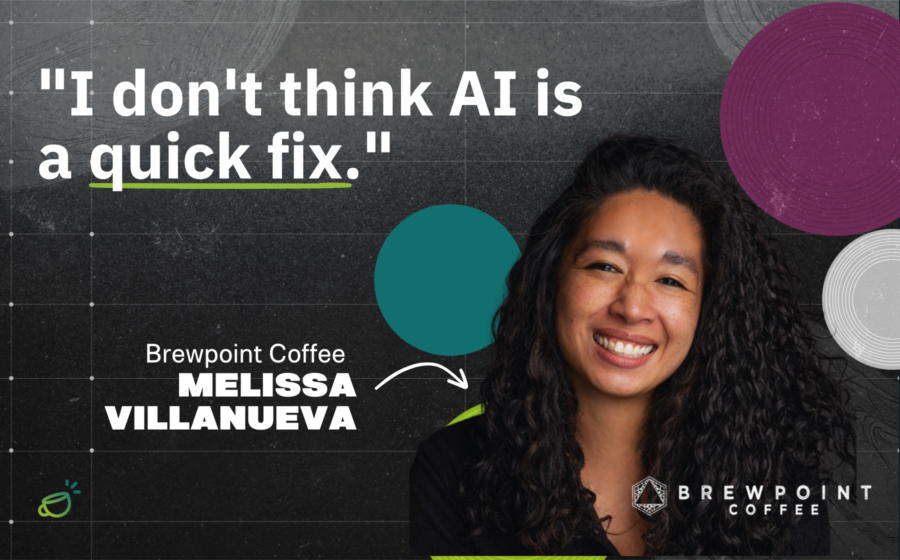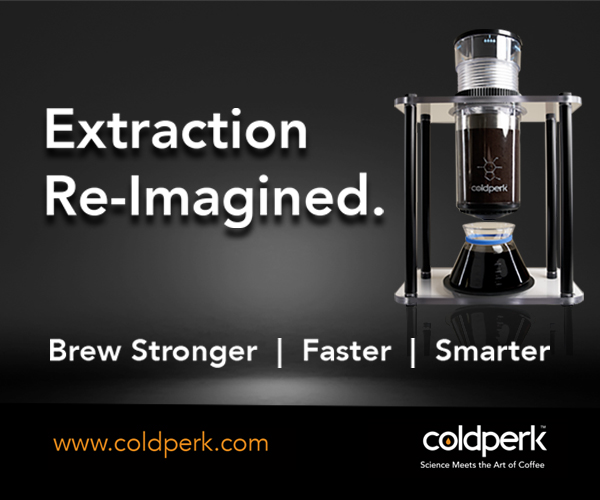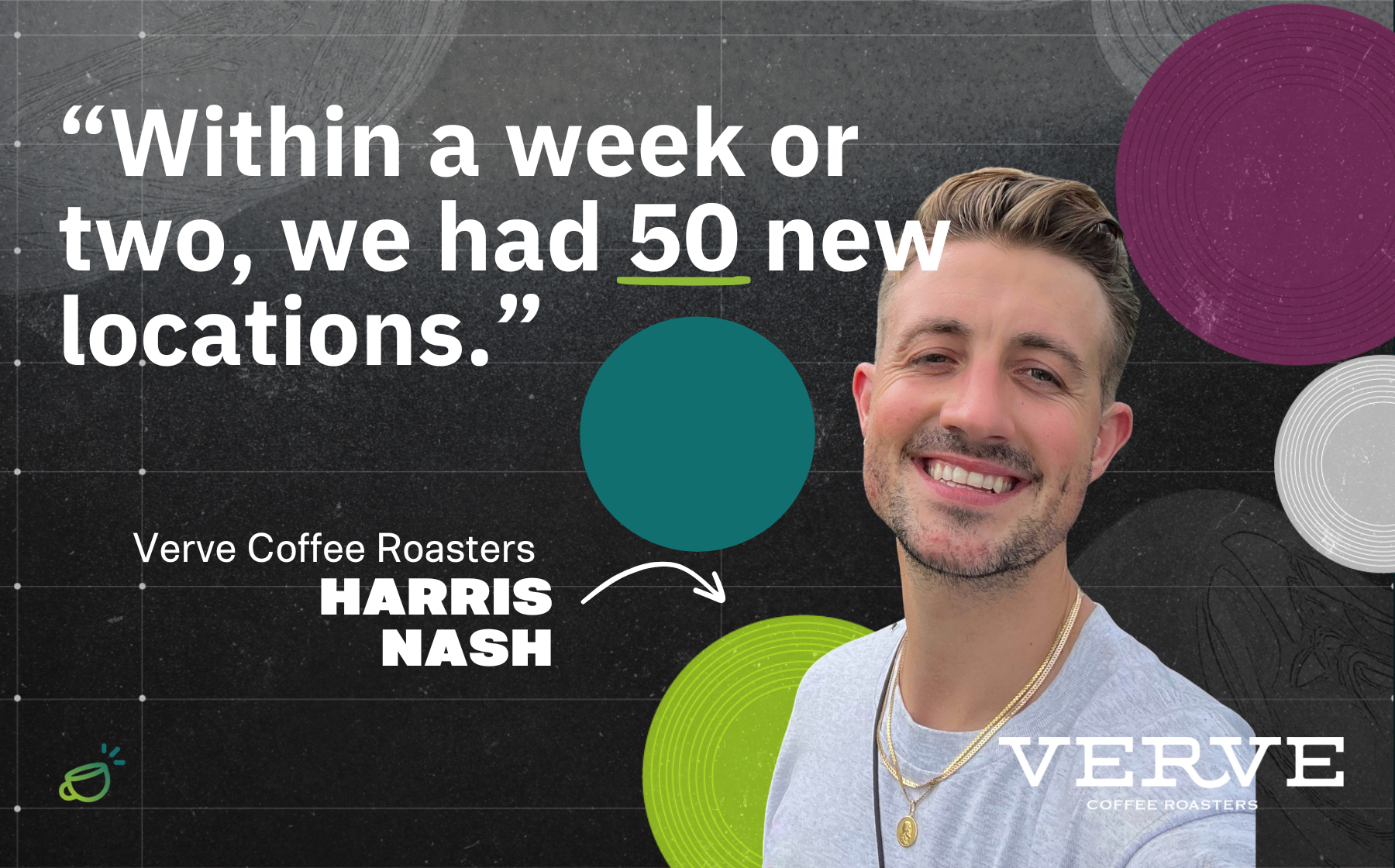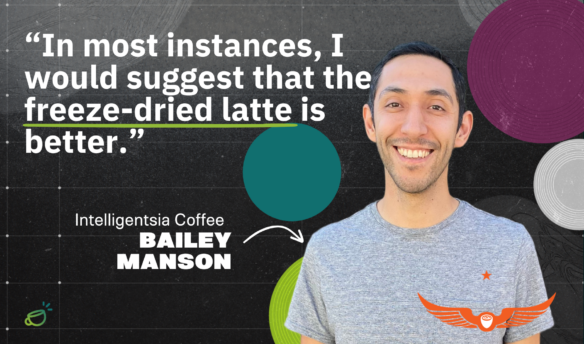Listen to the Coffee Think Tank Podcast, a show about trends, ideas, and innovations in coffee, on: Apple, Spotify, YouTube.
And a big thanks to this season’s sponsor, SumUp, a modern point of sale and loyalty system for cafes.
Artificial intelligence tools are transforming how businesses operate. But in an industry built on human connection and craft, coffee business owners must figure out how to balance using new tools with preserving the soul of their business.
That’s why I wanted to talk with Melissa Villanueva of Brewpoint Coffee. Villanueva is a vocal advocate for good business leadership and innovation in coffee, both at local events in Chicago and in her past interviews with Fresh Cup, and she’s someone I consider to be a sharp operator with a keen eye for how to use AI effectively.
In 2015, Villanueva purchased a coffee shop off Craiglist and grew it into Brewpoint Coffee, a thriving company with three cafes and a roastery in the Chicago area. Now, she’s navigating how to thoughtfully integrate AI tools without compromising what makes Brewpoint special.
From creating digital business assistants to help customers with cold brew recipes to simplifying equipment troubleshooting, she’s finding clever uses for AI that align with her values and make sense for her team.
Listen to past episodes of the Coffee Think Tank podcast here.
What You’ll Learn
- How Brewpoint uses AI as an operational enhancement tool rather than a replacement for creativity
- How Villanueva developed a philosophy for AI integration that aligns with her business values
- Practical applications of AI for coffee shops, from coffee recipe R&D to HR policy writing to equipment troubleshooting
- The importance of maintaining authenticity in customer-facing aspects of your business
- Why AI often works best for enhancing existing processes, not creating new ones
- How to evaluate which AI tools actually save time versus create more work
- The organizational discipline required to implement AI tools successfully
- Why Melissa believes AI might have limited her ambition had it existed when she started Brewpoint 10 years ago
My Key Takeaways
AI Is Best Used as a Thoughtful Tool, Not a Quick Fix
What stands out about Melissa’s approach to using AI in her business is how deliberately she evaluates each potential AI tool. Rather than jumping on new AI trends, she carefully asks what the target outcome of implementing an AI tool or process is to make sure she’s working on real business problems (and not wasting hours fiddling).
Each application of AI is linked to a real outcome, like…
- Create a chatbot loaded up with all Brewpoint’s equipment manuals to make it easier to diagnose equipment problems or find fixes
- Create a writing assistant that can help us draft HR policies that are well-rounded
- Create a Brewpoint expert chatbot (‘Ari’) that can answer basic questions about our cafes, coffees, and other products
This pragmatism has led her to both adopt and abandon various AI tools based on their actual utility. “I don’t think AI is a quick fix,” she explained. “There’s a lot of things I’ve tried that I’ve de-integrated.” She said some tools she’s passed on are either “ messy or janky or just [don’t] meet the needs that you actually have.”
I appreciated her perspective on maintaining brand values while using AI. For example, she created a tool called “Ari,” a custom assistant that answers questions about Brewpoint products and helps customers ideate creative recipes that use the company’s cold brew concentrate product. She emphasized the importance of establishing parameters: “I gave Ari all the prompts. I said when to be specific and structured, when do I want you to pull from the internet.”
But Melissa is cautious about implementing AI in areas that she feels should remain distinctly human, like customer service. “The relational aspect is so much the part of the soul of Brewpoint that I wouldn’t want AI to touch that,” she said.
If You Want AI to Be Useful, You Must Organize Your Inputs
Melissa talked a lot about the discipline required to use AI effectively in a business setting. “In order to use AI well,” she said, “I do think having a detailed, organized approach is the way to make sure that you have something that’s actually worth using.”
When I asked what these organizational inputs look like, Melissa gave me concrete examples, particularly around creating custom generative pre-trained transformers (GPTs): “You can essentially give [them] a handful of documents and prompts and structure directions and how you want it to respond.”
For her equipment troubleshooting GPT, she explained: “I upload all the manuals for all our pieces of equipment into a GPT, and that way we have a GPT we can ask when anything goes awry.” For her HR policies tool, she uploads her existing HR documents into a custom GPT to help brainstorm and write new policies as needed that are fully aligned with the existing policies.
Melissa found that without putting in the detailed work upfront, the outputs often weren’t worth using.
Sometimes Naivety Is an Entrepreneurial Advantage
I asked Melissa whether having AI when she started Brewpoint would have helped her grow the business. Her answer? It might have actually limited her success. “If I had AI to bounce off things with, I think it would have given me more guardrails… And I think it would have tempered what I thought was possible.”
She credits some of Brewpoint’s success to what she calls a “childlike delusion” about what was achievable—a naivety that led her to take risks that more calculated thinking might have discouraged. Sometimes, not knowing all the obstacles ahead is what allows entrepreneurs to take the leaps that ultimately lead to success.
Where to Find Our Guest
- BrewPoint Coffee website: https://brewpoint.coffee
- BrewPoint Coffee on Instagram: @brewpointcoffee
- Melissa Villanueva on Instagram: @melissaavillanueva
Referenced Resources
- ChatGPT (OpenAI’s AI assistant)
- Claude (Anthropic’s AI assistant)
- BrewPoint’s Nova Cold Brew Concentrate






